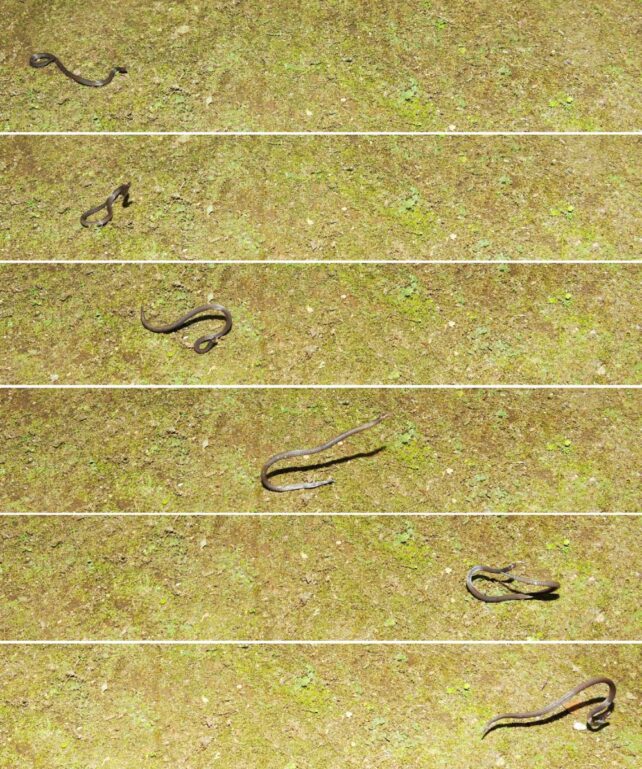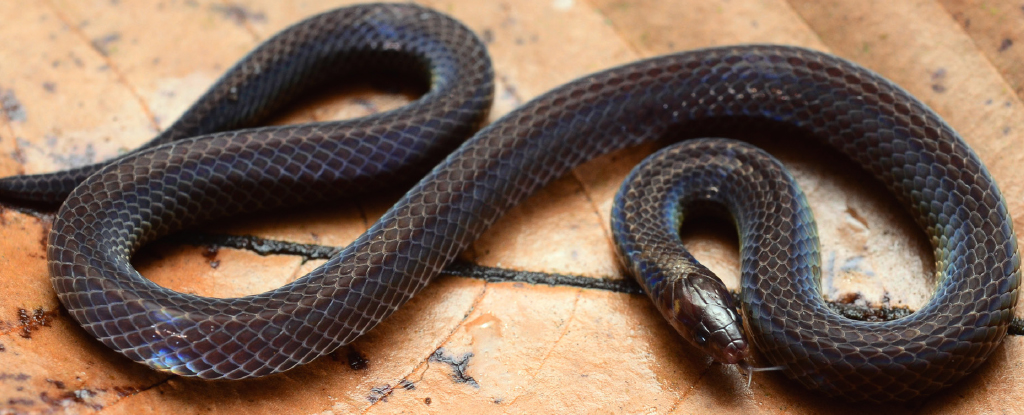Products You May Like
When you’re just a wee twisty, bendy rope of muscle, fang, and bone, your options may be slightly limited when you get yourself into a pickle.
That’s why the dwarf reed snake (Pseudorabdion longiceps) developed what appears to be a unique way of fleeing. When danger approaches, the small, South Asian serpent flings itself ass over teakettle in a bizarre cartwheeling motion that expedites its escape.
A new paper represents the first time this behavior, rarely seen in any animals, has been documented in snakes.
“We report in detail an observation of a novel escape behavior employed by this species – cartwheeling,” write a team of researchers led by biologist Evan Seng Huat Quah of Universiti Malaysia Sabah.
“Previously, there have only been anecdotal reports of this behavior and this is the first time it is documented with images and a detailed description.”
For an animal that is basically a scaly wigglestick with a sometimes-venomous bite, snakes do have a number of strategies for evading predation by other, bigger animals. These include camouflage, playing dead, fleeing, aggression, and defensive posturing. But smaller snakes are especially vulnerable to predation.
The dwarf reed snake is a secretive, nocturnal animal that hides itself in leaf litter or under logs during the day. Growing to a teensy 23 centimeters (9 inches) in length, its a perfect snack for predators that are known to include birds and other snakes, so it has a lot to contend with as it goes about its slithery business.
Crossing a mountain road in Malaysia one evening in August 2019, researchers happened across one such specimen. As they drew near, the startled snake flipped – literally – performing a series of cartwheels as it careened away.
“When approached, the snake was startled and throwing the coils of its body into a loop and began rolling to try and escape. The snake cartwheeled approximately 1.5 meters (5 feet) in less than 5 seconds down the road. By cartwheeling down an incline, the snake was able to gain speed and rapidly cover more ground,” the researchers describe.
It was the humans’ turn to be startled, but they didn’t remain so for long: they caught the snake, and placed it on a flat piece of ground, where they observed the snake repeat the behavior several times, showing that the wildly flailing escape method wasn’t simply the result of a scare and gravity. And they documented it, capturing it in a series of images that allowed them to analyze exactly how the snake does what it does.

The motion begins with the snake pulling its body into an S-shape, then launches the front half of its body into the air by pushing its tail against the ground. The entire body of the snake becomes airborne; when the head touches the ground, the tail flips forward, while the head and neck coil to launch again. The entire maneuver repeats; basically, the snake throws the coils of its body forward over each other repeatedly.
You can observe this behavior in action in the video below, captured by campers; the cartwheeling escape starts at around 1:50.
It’s not quite the fearsome Hoop Snake of legend… but it would still be pretty alarming if you weren’t expecting it.
Although other animals – including the golden wheel spider (Carparachne aureoflava) and some salamanders – roll to escape predators, their action is typically passive. The animal simply makes itself small and rolly, and the environment and gravity do the rest.
The dwarf reed snake stands out in its talent for active rolling, in which the reptile expends energy to flip away.
The odd behavior, the researchers said, could have a number of benefits. Combined with passive rolling (that is, when fleeing down a hill), the motion could help the snake move more quickly. The sudden flurry of motion could also serve to distract and confuse predators, while the snake makes its stylish exeunt. And the reduced contact the snake’s body has with the ground could result in a patchy scent trail, which would confuse nocturnal predators that rely more heavily on smell than sight.
Snakes can be pretty enigmatic creatures, so it’s not unprecedented that they have ways of getting around that haven’t been documented. It wasn’t too long ago that scientists recorded snakes using a peculiar “lasso” method to climb trees. So it’s likely that this species isn’t the only snake to cartwheel away from danger.
“My colleagues and I were excited when we successfully captured images that documented cartwheeling behavior in this species,” Quah says.
“We believe that this behavior may be more widespread in other small snake species, especially members of the subfamily Calamariinae, but the lack of records is probably an artifact of the challenges in detecting and observing these secretive species.”
The research has been published in Biotropica.
